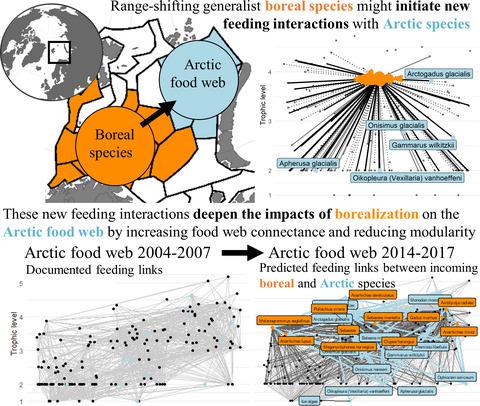当前位置:
X-MOL 学术
›
Glob. Change Biol.
›
论文详情
Our official English website, www.x-mol.net, welcomes your feedback! (Note: you will need to create a separate account there.)
Novel feeding interactions amplify the impact of species redistribution on an Arctic food web.
Global Change Biology ( IF 11.6 ) Pub Date : 2020-06-01 , DOI: 10.1111/gcb.15196 Laurene Pecuchet 1 , Marie-Anne Blanchet 1 , André Frainer 1, 2 , Bérengère Husson 3 , Lis L Jørgensen 3 , Susanne Kortsch 4 , Raul Primicerio 1
Global Change Biology ( IF 11.6 ) Pub Date : 2020-06-01 , DOI: 10.1111/gcb.15196 Laurene Pecuchet 1 , Marie-Anne Blanchet 1 , André Frainer 1, 2 , Bérengère Husson 3 , Lis L Jørgensen 3 , Susanne Kortsch 4 , Raul Primicerio 1
Affiliation

|
Species are redistributing globally in response to climate warming, impacting ecosystem functions and services. In the Barents Sea, poleward expansion of boreal species and a decreased abundance of Arctic species are causing a rapid borealization of the Arctic communities. This borealization might have profound consequences on the Arctic food web by creating novel feeding interactions between previously non co‐occurring species. An early identification of new feeding links is crucial to predict their ecological impact. However, detection by traditional approaches, including stomach content and isotope analyses, although fundamental, cannot cope with the speed of change observed in the region, nor with the urgency of understanding the consequences of species redistribution for the marine ecosystem. In this study, we used an extensive food web (metaweb) with nearly 2,500 documented feeding links between 239 taxa coupled with a trait data set to predict novel feeding interactions and to quantify their potential impact on Arctic food web structure. We found that feeding interactions are largely determined by the body size of interacting species, although species foraging habitat and metabolic type are also important predictors. Further, we found that all boreal species will have at least one potential resource in the Arctic region should they redistribute therein. During 2014–2017, 11 boreal species were observed in the Arctic region of the Barents Sea. These incoming species, which are all generalists, change the structural properties of the Arctic food web by increasing connectance and decreasing modularity. In addition, these boreal species are predicted to initiate novel feeding interactions with the Arctic residents, which might amplify their impact on Arctic food web structure affecting ecosystem functioning and vulnerability. Under the ongoing species redistribution caused by environmental change, we propose merging a trait‐based approach with ecological network analysis to efficiently predict the impacts of range‐shifting species on food webs.
中文翻译:

新颖的觅食相互作用放大了物种重新分布对北极食物网的影响。
由于气候变暖,物种正在全球重新分布,影响了生态系统的功能和服务。在巴伦支海,北方物种的极度扩张和北极物种数量的减少正在导致北极群落的迅速北方化。这种北方化可能通过在先前非共生物种之间创造新颖的觅食相互作用而对北极食物网产生深远的影响。尽早发现新的饲喂环节对于预测其生态影响至关重要。但是,通过传统方法进行的检测,包括胃内容物和同位素分析,尽管是基本方法,但却无法应付该地区观察到的变化速度,也无法理解物种重新分配对海洋生态系统的后果的紧迫性。在这个研究中,我们使用了广泛的食物网(metaweb),在239个分类单元之间结合了近2500个记录的饲养联系,再加上特征数据集,以预测新颖的觅食相互作用并量化其对北极食物网结构的潜在影响。我们发现,尽管相互作用的物种觅食的栖息地和代谢类型也是重要的预测指标,但喂养的相互作用很大程度上取决于相互作用物种的体型。此外,我们发现,如果北极地区重新分布,所有北方物种将至少具有一种潜在资源。在2014–2017年期间,在巴伦支海的北极地区观测到11种北方物种。这些传入物种都是通才,它们通过增加连通性和降低模块性来改变北极食物网的结构特性。此外,预计这些北方物种将与北极居民启动新的觅食互动,这可能会放大它们对北极食物网结构的影响,从而影响生态系统的功能和脆弱性。在环境变化引起的物种不断重新分配的情况下,我们建议将基于特征的方法与生态网络分析相结合,以有效地预测范围变化物种对食物网的影响。
更新日期:2020-06-01
中文翻译:

新颖的觅食相互作用放大了物种重新分布对北极食物网的影响。
由于气候变暖,物种正在全球重新分布,影响了生态系统的功能和服务。在巴伦支海,北方物种的极度扩张和北极物种数量的减少正在导致北极群落的迅速北方化。这种北方化可能通过在先前非共生物种之间创造新颖的觅食相互作用而对北极食物网产生深远的影响。尽早发现新的饲喂环节对于预测其生态影响至关重要。但是,通过传统方法进行的检测,包括胃内容物和同位素分析,尽管是基本方法,但却无法应付该地区观察到的变化速度,也无法理解物种重新分配对海洋生态系统的后果的紧迫性。在这个研究中,我们使用了广泛的食物网(metaweb),在239个分类单元之间结合了近2500个记录的饲养联系,再加上特征数据集,以预测新颖的觅食相互作用并量化其对北极食物网结构的潜在影响。我们发现,尽管相互作用的物种觅食的栖息地和代谢类型也是重要的预测指标,但喂养的相互作用很大程度上取决于相互作用物种的体型。此外,我们发现,如果北极地区重新分布,所有北方物种将至少具有一种潜在资源。在2014–2017年期间,在巴伦支海的北极地区观测到11种北方物种。这些传入物种都是通才,它们通过增加连通性和降低模块性来改变北极食物网的结构特性。此外,预计这些北方物种将与北极居民启动新的觅食互动,这可能会放大它们对北极食物网结构的影响,从而影响生态系统的功能和脆弱性。在环境变化引起的物种不断重新分配的情况下,我们建议将基于特征的方法与生态网络分析相结合,以有效地预测范围变化物种对食物网的影响。



























 京公网安备 11010802027423号
京公网安备 11010802027423号